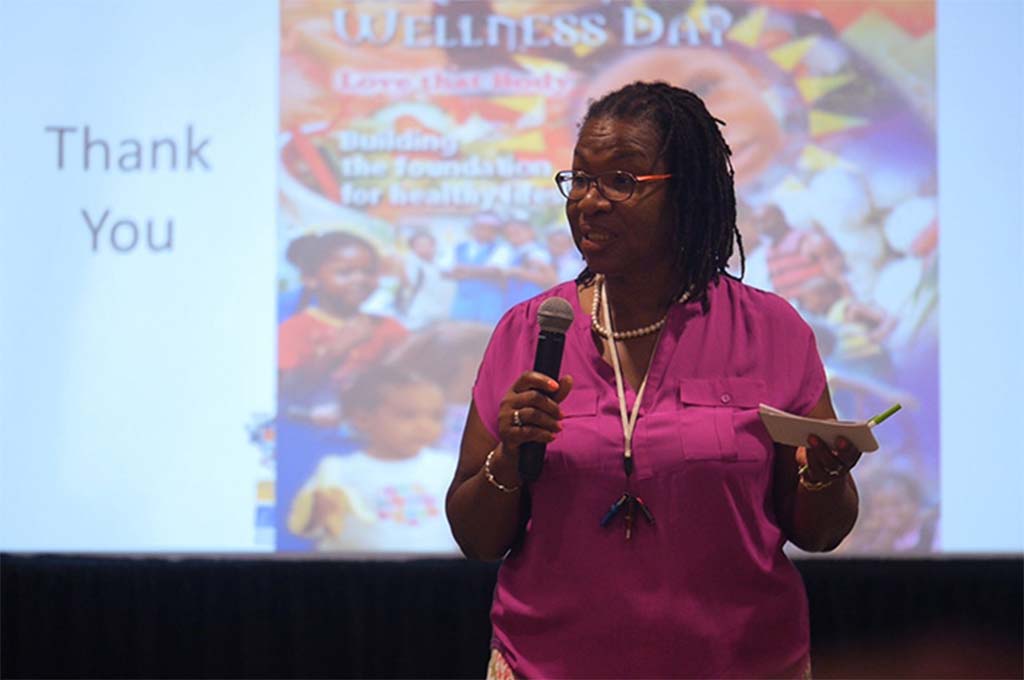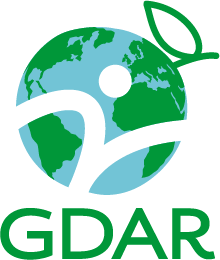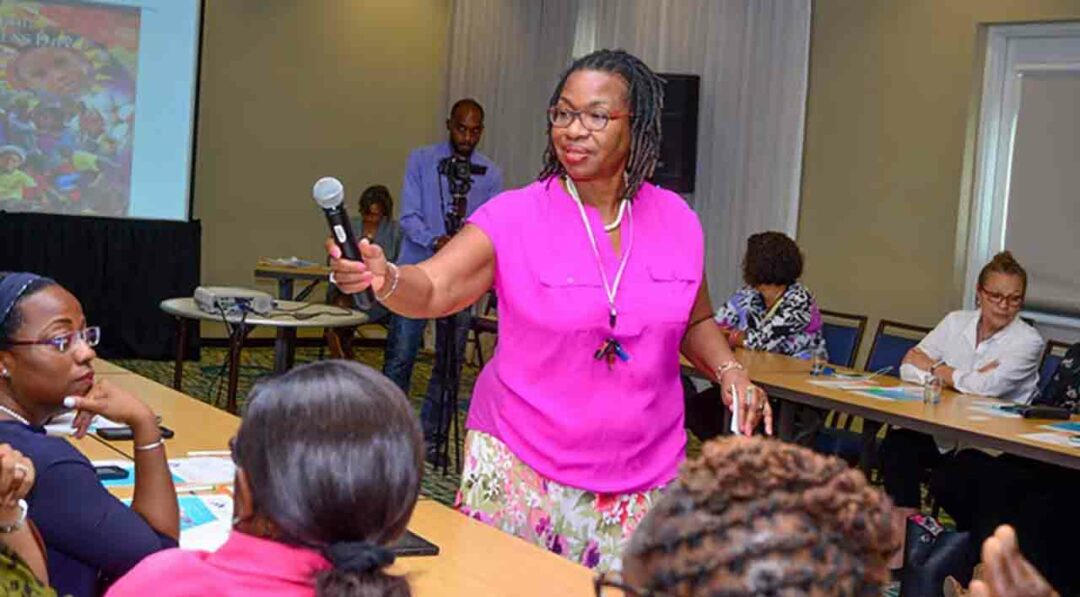This blog is the first in a series of captivating narratives and insights from experienced researchers working in LMICs with at least 15 years of impact. Our Early Career Researchers (ECRs) delve into the inception of their career and personal journeys, and the experiences and exposures that shaped their trajectories.
By Nina Abrahams on behalf of the ECR team.
The career journey of T. Alafia Samuels, co-director of GDAR Spaces
There is so much to learn from the career journey of T. Alafia Samuels. She is currently the co-director of, and mentor at, the Global Diet and Activity Research (GDAR) Spaces network; an honorary professor at the Caribbean Institute for Health Research, and a member of the High Level Policy Expert Group advising the WHO on NCDs in small island developing states.
Be open to different cultures and perspectives, everyone has something to offer
Alafia was born in the United States to a Creole father from Sierra Leone and a mother from Jamaica. By age one, she had moved from the US to Ghana and then to Sierra Leone. At the age of seven, the family moved to Canada, and then settled in Jamaica. “This creation out of these multiple cultures I think has made me open to differences in people … your assumptions are not necessarily valid from one country to another.”
Later, when working as a senior medical officer in Kingston, Jamaica, managing a large Primary Care and Public Health staff across urban and rural settings, including the capital city of Kingston, she learnt valuable lessons in meaningfully engaging with those around her. “I engaged in something called MBWA – management by walk-about – you have to go to the sites where you are delivering the services … that’s where the rubber hits the road and sitting in an office is not going to tell you that.” She also learnt the importance of having an open-door policy, “I wanted people to know they were free to come at any time and tell me anything they wanted to tell me…it’s not just the door that needs to be open but your mind also. You have to recognise that everybody can teach you something.”
Don’t always do what is expected: “Life is like that, you can always do two things”
Due to her good grades at school it was expected that Alafia would go into medical school:
“I actually took a year off, the rebel that I was … I didn’t want anyone to assume I would do the normal”. Instead she first studied sociology and philosophy to broaden her understanding of the world beyond chemistry and physics. During medical school she worked part time at SWING, an entertainment magazine in Jamaica, “this was very exciting for me, this was the time that Jamaican music was going international, all the stars and musicians used to come by the office.” Currently, outside of work Alafia enjoys dancing, sewing, and travelling.
Alafia recognises that the downside of having many career ventures means “you may not get the top job” in any one path; however, it is worth having “the exposure to variety and the nuances and all that, I wanted to experience life in many lanes.” This is evidenced by the fact that even though Alafia is a chronic disease epidemiology expert she led a review of COVID-19 response in the Caribbean and has written Ministry of Health Strategic Plans for injuries, and worked with the health economics team from University of West Indies in Trinidad and Tobago on health insurance, among others: “I was able to stretch, I can learn.”
Internal change has to come first, the rest will follow

In her mid-30s Alafia decided to prioritise having a child and made it happen and moulded her career to fit around that (with the support of her mother). “That’s the philosophy in life, you make sure you are ready for what you want to do and the things outside will fall into place.” After obtaining her PhD in Chronic Disease Epidemiology at John Hopkins and later working as a Clinical Director in a corporate company, she moved back to the Caribbean after 12 years in the US which better suited her world view and career goals.
Alafia has experienced her fair share of racial and gender discrimination in the workplace. She advises ECRs to “look for an exit strategy” when they find themselves in hostile environments to “keep your sanity. But also keep your sanity and don’t allow your emotions to overcome what you need to do. Once you advance in your career you can start to more frontally challenge what is happening around you.”
Making a difference at scale
“I recognised early in medical school that one-to-one medicine was not going to really solve our problems.” She has held many roles to break the medical mould including early in her career creating medical management systems for the Chief Medical Officer in the Ministry of Health as well as managing both primary and secondary healthcare, usually very siloed systems, in a rural parish in Jamaica. “The two don’t usually speak, and they have a lot to talk about … this is part of what brought the holistic medicine conceptualisation for me.”
Alafia’s clinical experience made her aware that the fight against non-communicable diseases requires large-scale solutions. “In the face of unrelenting marketing for unhealthy foods, the only hope would be using fiscal measures to make unhealthy foods more expensive and cross-subsidising healthy foods to make them cheaper”. She also emphasises the need for political will, administrative policies, and practices to be mobilised to actually accomplish this aim. Alafia has been called the “fast-food watchdog in the Caribbean”, due to her role in vocalising the need for taxes and regulations on unhealthy foods and unhealthy fast-food companies and dreams of a global ban on trans fats.
Navigating academia as an Early Career Researcher
Alafia wants to remind ECRs that academia is a tiny lens from which to view the world. “Remember to engage in the real world, the real world does not care what academics are thinking, academics need to make themselves relevant by studying what policy makers want to know.” Also, do not feel the need to specialise (e.g. PhD) too quickly, it can be helpful to have a “wide base” on which to build your career from.
For ECRs, Alafia feels that “academic excellence is maybe 30-40%, and 60% is what they call the soft-skills”: for example, knowing how to be a member of a team, learning how teams operate, and taking note of different leadership styles, “follow a leader before you can be a leader.” She also reminds us to find mentors and use open courses more, information and learning from great institutions are out there for free, “why reinvent the wheel?”
Final words: “Be receptive to new ideas, be respectful of people, learn everyday, keep engaged, and keep it going.”
From medical doctor to public health and advocate leader, a CV
Alafia’s career spans on-the-ground clinical work, advising governments and international health bodies, CARICOM Secretariat, and academia. Her previous experience includes practice as a medical doctor, senior medical officer managing all public health services in Kingston Jamaica, Director of the George Alleyne Chronic Disease Research Centre, and deputy dean for research and graduate programmes. She has been PI and co-PI for many research projects, NCD Advisor to the Healthy Caribbean Coalition, past Chair of NCD Child, Lancet Commissioner for their One Health Commission, PAHO/WHO consultant, and former Co-Chair of the World Obesity Federation Policy and Prevention committee. Alafia’s research interests include policy and practice in NCD prevention and control, clinical quality of care, and planning and evaluation of NCD programs, and she has over 60 peer-reviewed publications and technical reports.

